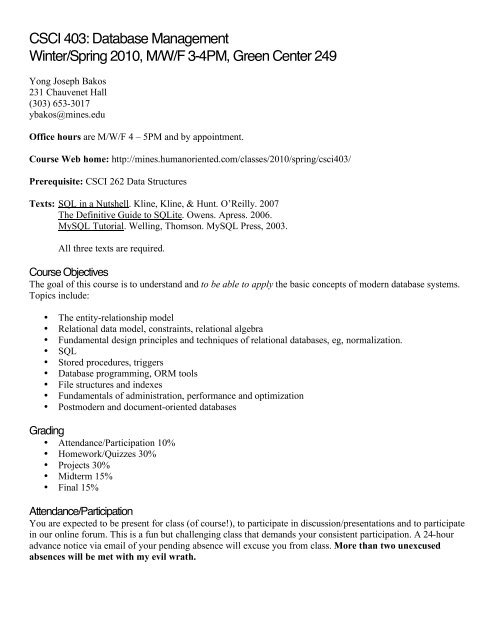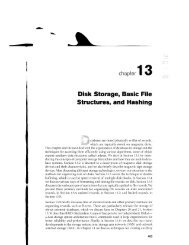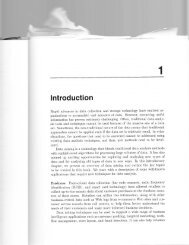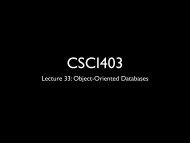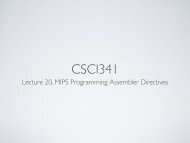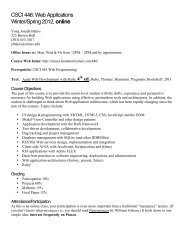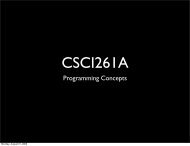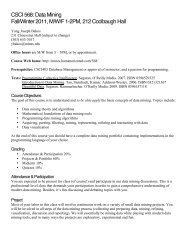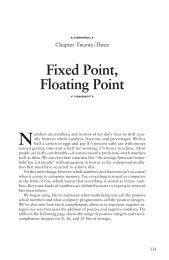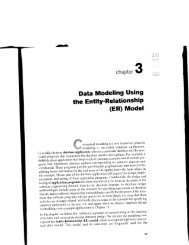CSCI403 Database Management Syllabus-2 - Yong Joseph Bakos
CSCI403 Database Management Syllabus-2 - Yong Joseph Bakos
CSCI403 Database Management Syllabus-2 - Yong Joseph Bakos
Create successful ePaper yourself
Turn your PDF publications into a flip-book with our unique Google optimized e-Paper software.
CSCI 403: <strong>Database</strong> <strong>Management</strong><br />
Winter/Spring 2010, M/W/F 3-4PM, Green Center 249<br />
<strong>Yong</strong> <strong>Joseph</strong> <strong>Bakos</strong><br />
231 Chauvenet Hall<br />
(303) 653-3017<br />
ybakos@mines.edu<br />
Office hours are M/W/F 4 – 5PM and by appointment.<br />
Course Web home: http://mines.humanoriented.com/classes/2010/spring/csci403/<br />
Prerequisite: CSCI 262 Data Structures<br />
Texts: SQL in a Nutshell. Kline, Kline, & Hunt. O’Reilly. 2007<br />
The Definitive Guide to SQLite. Owens. Apress. 2006.<br />
MySQL Tutorial. Welling, Thomson. MySQL Press, 2003.<br />
All three texts are required.<br />
Course Objectives<br />
The goal of this course is to understand and to be able to apply the basic concepts of modern database systems.<br />
Topics include:<br />
• The entity-relationship model<br />
• Relational data model, constraints, relational algebra<br />
• Fundamental design principles and techniques of relational databases, eg, normalization.<br />
• SQL<br />
• Stored procedures, triggers<br />
• <strong>Database</strong> programming, ORM tools<br />
• File structures and indexes<br />
• Fundamentals of administration, performance and optimization<br />
• Postmodern and document-oriented databases<br />
Grading<br />
• Attendance/Participation 10%<br />
• Homework/Quizzes 30%<br />
• Projects 30%<br />
• Midterm 15%<br />
• Final 15%<br />
Attendance/Participation<br />
You are expected to be present for class (of course!), to participate in discussion/presentations and to participate<br />
in our online forum. This is a fun but challenging class that demands your consistent participation. A 24-hour<br />
advance notice via email of your pending absence will excuse you from class. More than two unexcused<br />
absences will be met with my evil wrath.
Homework<br />
There will reading assignments and quizzes assigned frequently, with the goal of preparing you for the midterm<br />
and final. Late homework will not be accepted, except for unusual circumstances.<br />
Projects<br />
We will be engaged in multiple projects designing, implementing, maintaining and programming with a<br />
relational database system. This is the most critical component in reaching our course objectives. Additional<br />
details will be provided during class.<br />
Exams<br />
One midterm exam will be conducted the week of March 1, 2010.<br />
The final exam will be conducted during the week of May 3, 2010.<br />
A makeup examination can be arranged only when a student has an emergency (eg, medical emergency or<br />
urgent family matter). The student may be asked to provide the instructor with an appropriate document, such as<br />
a doctor’s note.<br />
Accommodation<br />
If you need certain accommodation based on disability, talk to the instructor in person so that appropriate<br />
arrangements can be made. If you will be absent from class, you will be excused if you send me an email or<br />
tell me in person ahead of your absence.<br />
Course Schedule<br />
This schedule is not fixed in stone and is subject to change according to the actual progress of the course.<br />
Week Lecture Reading*<br />
1 Introduction, Basic Concepts SQLite 1<br />
SQLite 2, FDBS 1, 2<br />
2 Basic Concepts, History, Data Storage<br />
(pdf)<br />
3 ER Model, Other Notations FDBS 3 (pdf)<br />
SQLite 3, FDBS 5, 7<br />
4 Relational Model, SQL & SQLite<br />
(pdf)<br />
5 ER-to-Relational Mapping, <strong>Database</strong> Design SQLite 4<br />
6 Relational <strong>Database</strong> Design, SQL SQLite 4<br />
<strong>Database</strong> Programming (C, PHP, Java, .Net,<br />
7 Python, Ruby)<br />
8 <strong>Database</strong> Programming (Ruby)<br />
9 Midterm, Storage, Indexing SQLite 5<br />
10 (Spring Break)<br />
11 MySQL, Security, System Architecture MySQL<br />
12 Transactions, Stored Procedures, Triggers MySQL<br />
13 Performance, Data Mining, OLAP MySQL<br />
14 <strong>Database</strong> Programming (ORMs, Hibernate)<br />
<strong>Database</strong> Programming (ActiveRecord,<br />
15 DataMapper)<br />
16 Problems, Trends, Postmodern <strong>Database</strong>s<br />
17 (Dead Week)<br />
18 Final Exam<br />
* Chapters noted are from textbooks and provided pdfs and are provided here merely as a guide.
On Collaboration & Academic Integrity<br />
Students are encouraged to discuss and collaborate as much as possible. However, it is obviously not<br />
acceptable to copy another student’s solution. Your work must be your own. In addition, simply copying<br />
solutions found online is not acceptable. Be aware that homework assignments, project and midterm will not<br />
just focus on producing correct code, but explaining how things work.<br />
Please see the Student Handbook for details on academic dishonesty. No exceptions will be made for students<br />
found simply giving away or taking another’s solutions.<br />
Academic Integrity Pledge<br />
Being enrolled in this class means that you pledge to uphold the high standards of academic ethics and integrity<br />
expressed by the Colorado School of Mines Student Honor Code by which you are bound. In particular, you<br />
will not misrepresent the work of others as my own, nor will you give or receive unauthorized assistance in the<br />
performance of academic coursework. You should understand that my instructor will report any infraction of<br />
academic integrity to the Department Head and that any such matter will be investigated and prosecuted fully.


